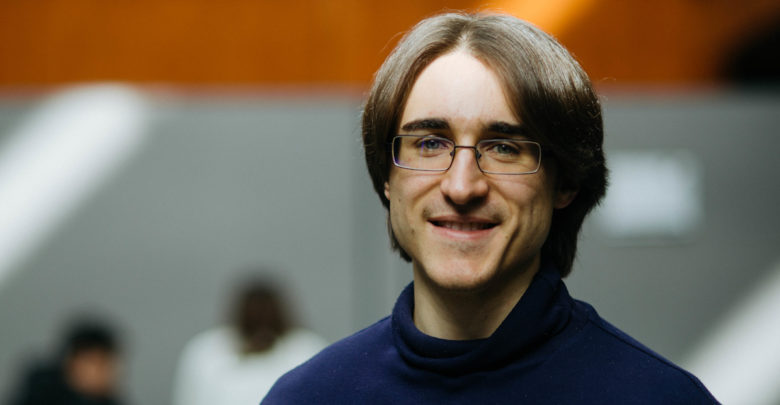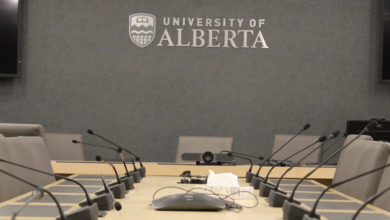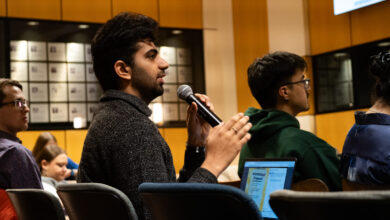 Nana Andoh
Nana AndohArtificial intelligence (AI) is continuing to break boundaries and researchers at the University of Alberta push this notion further, including PhD student Dustin Morill.
Morrill, a fourth-year PhD student working with computing science professor Michael Bowling, is working on algorithmic game theory. He is also apart of the Alberta Machine Intelligence Institute (Amii) and has been a key contributor to DeepStack, a project seeking to have artificial intelligence develop techniques for games like poker and checkers to continually reassess strategy.
The Gateway interviewed Morrill who is continuing to contribute to AI research and see what he had to say about the field.
Responses have been edited for clarity and length.
The Gateway: Why is it important to study algorithmic game theory?
Morrill: If you think about why people play games, you can think about all of the things you can learn in games; how they are a proving ground for real-life decision making. When kids are young, they are just starting to play games and are learning about different shapes and colours. Eventually, they learn their decisions have consequences. That they can change things by what they do. Then they learn about planning or thinking about how they can make certain outcomes come about. Games also have multiple people playing them, so kids have to learn how social skills like how to cooperate with others, and aligning personal goals with those of others or coming to points of compromise.
All of these sorts of complicated real-life, societal values, and experiences are encapsulated in games that many kids play or ones we continue to play throughout our lives. In games you get more immediate feedback and the consequences for mistakes or failure are much smaller. So games become a great way for us researchers to learn and test new ideas in a safe way for algorithms and AI. We want our AI to learn all those same lessons. We want our AI to understand the world, to plan, to make good decisions, and cooperate with other agents — whether they be other AI or humans.
Why did you choose this particular field as your area of study?
I have always been interested in games, game-playing, and decision-making. Thinking about how to make decisions has always been something I enjoy exploring. Looking at stakes and risks while also balancing other factors is thrilling to both do and study. Decisions require rigorous analysis and balancing acts. It’s cool to explore that.
I didn’t get into computing science right away. I only got into it in my second year at university. I was just taking general sciences in my first-year in 2008. I had a really great instructor in my first year in an introductory computing science class. It was that class that really got me excited. At that time Jonathan Schaeffer had just solved checkers with AI. We talked about that in class and it continued to amaze me. From there I continued to attend AI talks whenever I saw them and algorithmic strategizing. I haven’t regretted my pivot and move away from general sciences one bit.
Now, you are studying at the University of Alberta and working with Amii at the cutting edge of AI research. What has that been like?
It’s been really good. I really enjoy studying science and AI and game theory. It’s been a great experience overall. I’ve had the opportunity to not only learn concepts but work with great people and put them into real-world practice. Going to conferences to speak with other researchers around the world has also been a highlight for me.
Working with DeepStack was huge. What we did was become the first group to have AI capable of beating professional poker players at heads-up no-limit Texas hold’em poker.
I’ve also got to meet a lot of other students working in the field through Amii and Deepstack. It’s been fascinating to see their research and experience.
You just finished an internship with Google’s DeepMind. What’s next for you?
The environment there was fantastic. The people, the work, and the complex problems we were trying to work towards solving was thrilling. Going back there to do industrial research would be really exciting. That is an opportunity I would really want to pursue.
I still have a significant part of my PhD studies to go. I have to finish my candidacy. For the rest of my PhD research I am looking to apply the research techniques I’ve been using elsewhere to solve AI safety problems; so thinking about situations where we could program AI agents where they might do what we don’t want them to do and how we can build in-game theory algorithms so that doesn’t happen. That would help algorithms behave cooperatively.
Why do you think AI is so important for the world to pursue?
It is the next frontier. It’s an exciting area of research that helps us understand intelligence and people in general. And it has such potential for bringing positive change to the world and improving people’s lives.




